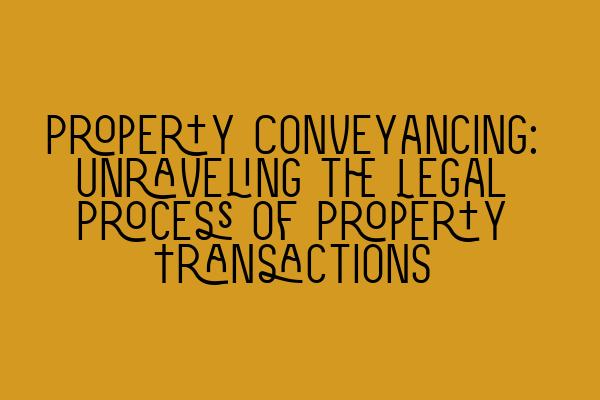Property Conveyancing: Unraveling the Legal Process of Property Transactions
Welcome to the SQE Property Law & Land Law blog! Today, we dive into the intricate world of property conveyancing and unravel the legal process behind property transactions. Whether you’re a first-time homebuyer, a property investor, or a legal professional looking to expand your knowledge, this article will provide you with a comprehensive overview of property conveyancing.
What is Property Conveyancing?
Property conveyancing is the legal process of transferring property ownership from one party to another. This process involves a series of steps and legal documentation to ensure a smooth and lawful transfer of property. Whether you’re buying or selling a property, seeking a mortgage or remortgage, or transferring property as part of inheritance or gifting, property conveyancing is an essential component of the transaction.
To begin the conveyancing process, the buyer or seller typically engages the services of a solicitor or a conveyancer. These legal professionals specialize in property law and are well-versed in handling the complexities of property transactions.
The Conveyancing Process
The conveyancing process consists of several stages, each aimed at protecting the interests of both the buyer and the seller. Let’s explore these stages in detail:
1. Pre-Contract Stage
The pre-contract stage involves various preliminary activities, including:
- Obtaining a copy of the property’s title from the Land Registry
- Conducting property searches to uncover any potential issues or restrictions
- Reviewing relevant legal documentation, such as the property’s Energy Performance Certificate and Planning Permission documents
- Obtaining a mortgage offer (if applicable)
During this stage, the buyer’s solicitor or conveyancer will also draft or review the draft contract of sale and negotiate any necessary amendments with the seller’s legal representative.
For more information on property law and to enhance your knowledge for the SQE exams, check out our SQE 1 Practice Exam Questions and SQE 1 Practice Mocks FLK1 FLK2 articles.
2. Exchange of Contracts
Once both parties are satisfied with the terms outlined in the contract, the buyer and seller will proceed to exchange contracts. During this stage, the buyer will typically pay a deposit (usually around 10% of the property’s purchase price) to the seller’s solicitor or conveyancer.
After the exchange of contracts, both parties are legally bound to complete the transaction as agreed upon. If either party fails to fulfill their obligations, they may face legal consequences, such as financial penalties or legal action.
3. Pre-Completion Stage
In the pre-completion stage, the buyer’s solicitor or conveyancer will finalize the necessary paperwork and ensure that all relevant conditions are met, including:
- Performing a final property search to uncover any last-minute issues
- Preparing a completion statement outlining the financial details of the transaction
- Arranging for payment of the outstanding balance to the seller’s solicitor or conveyancer
Additionally, the buyer’s solicitor or conveyancer will liaise with the mortgage lender (if applicable) and obtain the mortgage funds in preparation for completion.
Equip yourself with the knowledge needed to excel in property law with our SQE 2 Preparation Courses and SQE 1 Preparation Courses.
4. Completion
Completion marks the final stage of the conveyancing process, where ownership is legally transferred, and the balance of the purchase price is paid to the seller’s solicitor or conveyancer. During this stage, the buyer’s solicitor or conveyancer will register the property transfer with the Land Registry, ensuring that the buyer’s ownership rights are officially recognized.
The Importance of Professional Legal Assistance
Given the complexity and legal implications involved in property conveyancing, it is highly recommended to seek the assistance of a qualified solicitor or conveyancer. These professionals possess the knowledge, expertise, and experience required to navigate the intricacies of property transactions and minimize the risk of any potential issues arising throughout the process.
Stay up-to-date with SRA SQE exam dates and other important legal information by visiting our SRA SQE Exam Dates article.
Conclusion
Property conveyancing is a crucial legal process that ensures the smooth and lawful transfer of property ownership. By understanding the different stages and seeking professional legal assistance, buyers and sellers can navigate the complexities of property transactions with confidence and peace of mind. If you’re preparing for the SQE exams, make sure to check out our related articles on practice exam questions and preparation courses to enhance your knowledge in property law.
